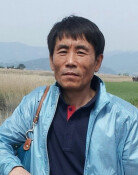The Japanese: The Group That Is Genetically Closest to Koreans
The Japanese: The Group That Is Genetically Closest to Koreans
Posted August. 04, 2005 03:13,
A single-nucleotide polymorphism (SNP) genetically distinguishes a person from another. According to a study, Koreans are more closely linked genetically to the Japanese than to the Chinese.
Dr. Cho In-ho at the department of Biomedical Science at the Korea National Institute of Health (KNIH) and a research team headed by Dr. Lee Jong-eun of DNA Link, a biotechnology venture firm, have analyzed SNPs of Koreans and compared them to those of foreigners. The research is the largest one in Korea. On August 3, they announced that they completed a comparative SNP map.
They issued a high-density human SNP map in cooperation with the SNP Consortium (TSC), an American cooperative body for SNP research to which the Cold Spring Harbor Laboratory and others belong. The SNP map has been chosen to be the cover story of the August issue of Genomics, a scientific journal.
The researchers acquired 55,018 SNPs in total from Americans with European origin, African Americans, Asians, and other racial or ethnic groups. Among the SNPs, those of Koreans were 8,333.
What is an SNP?
The sequence of DNA bases of all men and women is a 99.9 percent match. The differences in skin color, appearance, the susceptibility to diseases, and other inherent factors stem from the unmatched genetic part of 0.01 percent. The concept of an SNP refers to the 0.01 percent genetic difference.
Genetic Gaps between Races-
The study showed that the biggest gap exists between Asians and Africans at 18.82 percent.
The narrowest was between Koreans and Japanese at 5.86 percent. It was 8.39 percent between Koreans and the Chinese, and 8.61 percent between the Chinese and the Japanese.
Dr. Lee said, It is hard to say definitively when we didnt include into our study the analyses of the genes of the ethnic groups such as Mongolians that live close to the Korean peninsula. But the genetic homogeneity of Koreans is the most remarkable among the groups in the study.
Will Tailored Treatments Be Feasible?
Dr. Cho explained, Our study is a milestone in that the comparison of the SNPs of Koreans and foreigners has set the basis for tailored treatments. The fact that Koreans and Japanese share genetic features suggests the possibility of jointly developing medicines targeting certain diseases.
If the SNP of every individual is studied and mapped, in theory, it is possible to forecast the outbreak of diseases. However, Dr. Cho said, If tailored treatments are to be offered, every SNP in every disease type has to be compared with others in other disease types. To add to this, a difficult process of finding out how many disease-related SNPs there are in an individual is needed.
Hee-Kyung Kim susanna@donga.com
Headline News
- Internal rebellion investigation transferred to Public Prosecutor's Office
- Gov’t to approve Yongin Semiconductor National Industrial Complex
- US conservatives rally around Trump’s third term
- Lee Hyo-song named youngest Rookie of the Year in JLPGA history
- Controversy escalates over the appointment of Constitutional Court justices







